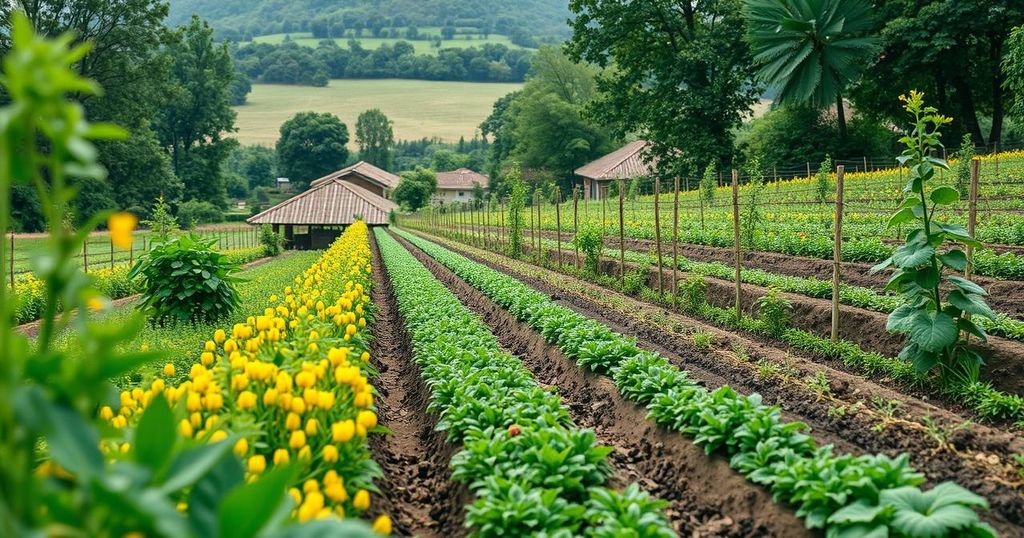The 2024 World Agri-Food Innovation Conference emphasized the need for an innovation-driven green transition in the agri-food sector to combat the effects of climate change on food production. Experts warned of significant disruptions in agriculture due to global warming and the necessity for research and technological innovations to maintain food security. China’s efforts in increasing food production and rural development were highlighted as a positive example amidst global challenges.
In a recent gathering at the 2024 World Agri-Food Innovation Conference in Beijing, a diverse group of global agrarians underscored the necessity of adopting innovation-driven strategies for the green transition of the agri-food sector. This transition is critical for addressing carbon emissions and lessening the adverse effects of climate change on food production. Although some food-producing regions may have initially experienced positive impacts due to warmer weather, experts indicated that the unpredictability introduced by global warming is creating significant disruptions in agriculture across Asia, Africa, and South America. Sun Qixin, the president of China Agricultural University and an academician at the Chinese Academy of Engineering, shared insights on the potential decline in food production. He explained that mainstream models predict a decrease of 6 to 8 percent in food production for each 1 degree Celsius increase in global temperatures, highlighting the pressing need for technological innovations to mitigate these effects. Furthermore, he noted that the consequences of a warming climate are not evenly distributed worldwide, which aggravates the complexities of global food security. “However, the impact of a warmer climate is not uniform across the globe,” he emphasized. Even though there are cases where a warmer and wetter climate has enhanced food production in previously cooler regions, more extreme and sudden changes in weather patterns have caused widespread agricultural instability globally. Sun advocates for substantial investments in research and technological advancements to facilitate the green transition while ensuring that agricultural output is not compromised. Fu Wenge, another professor at China Agricultural University, argued that facilitating the green transition does not always hinge on breakthrough innovations. He stated that minor, cost-efficient adjustments in management practices could lead to transformative impacts. He referenced the university’s “Science and Technology Backyard” project, which immerses students in rural settings to work alongside smallholder farmers, thereby promoting high-yield crop varieties and eco-friendly farming techniques. The significance of cross-country collaboration and comprehensive innovation across technological, policy, and institutional realms was also highlighted by Ismahane Elouafi, executive managing director of CGIAR. She remarked, “The impact of climate change is multiplying every day, and the only way forward for us is to adopt innovation in its broad sense to really transform the agriculture system.” Experts share that enhancing food production with a reduced carbon footprint is crucial, coupled with a commitment to environmental stewardship. Patrick Caron, vice-chair of the CGIAR system board, reflected on humanity’s historical success in increasing food production while emphasizing current efforts must prioritize sustainability and the preservation of land, water, and biodiversity. China’s commitment to bolstering its food production capabilities is regarded as a beacon of hope amidst global food insecurity challenges. The country aspires to elevate its annual food production to about 700 million metric tons by 2030, an increase from the 695 million tons recorded in 2023. Elouafi praised China’s dual accomplishments in boosting agricultural productivity and concurrently addressing poverty and hunger. Furthermore, it is noted that despite recent setbacks in global efforts to combat hunger, significant advancements were made between 2000 and 2017, primarily due to China’s initiatives in the agri-food sector as well as rural income enhancement programs. As the world commemorated World Food Day, Foreign Ministry spokeswoman Mao Ning reaffirmed China’s dedication to global food security, highlighting the nation’s significant contributions exceeding those of any other developing country in the Food and Agriculture Organization’s South-South Cooperation Programme. She expressed China’s readiness to foster international cooperation aimed at achieving a hunger-free world.
The discussion on the green transition in the agri-food sector arises amidst growing concerns about the impact of climate change on food production systems globally. Experts are advocating for a strategic shift towards innovation to address the dual challenges of food security and environmental sustainability. The 2024 World Agri-Food Innovation Conference served as a platform for leading agrarians to share insights and collaborations aimed at long-term solutions for agricultural disruptions caused by climate change. With a strong emphasis on research and technological improvements, collaborative efforts across nations are deemed essential to successfully implement a green transition while ensuring food availability and environmental integrity.
The experts at the 2024 World Agri-Food Innovation Conference highlighted the urgency of an innovation-driven green transition in the agri-food sector to combat climate change and enhance food security. Technological advancements, policy reforms, and grassroots initiatives are identified as crucial components in addressing the complexities posed by a changing climate. China’s ambitious goals in food production and its active contribution to global food security exemplify positive strides towards nurturing a sustainable agri-food system. As the world faces increasing food insecurity, it is imperative that stakeholders prioritize environmental considerations alongside agricultural productivity.
Original Source: en.people.cn






